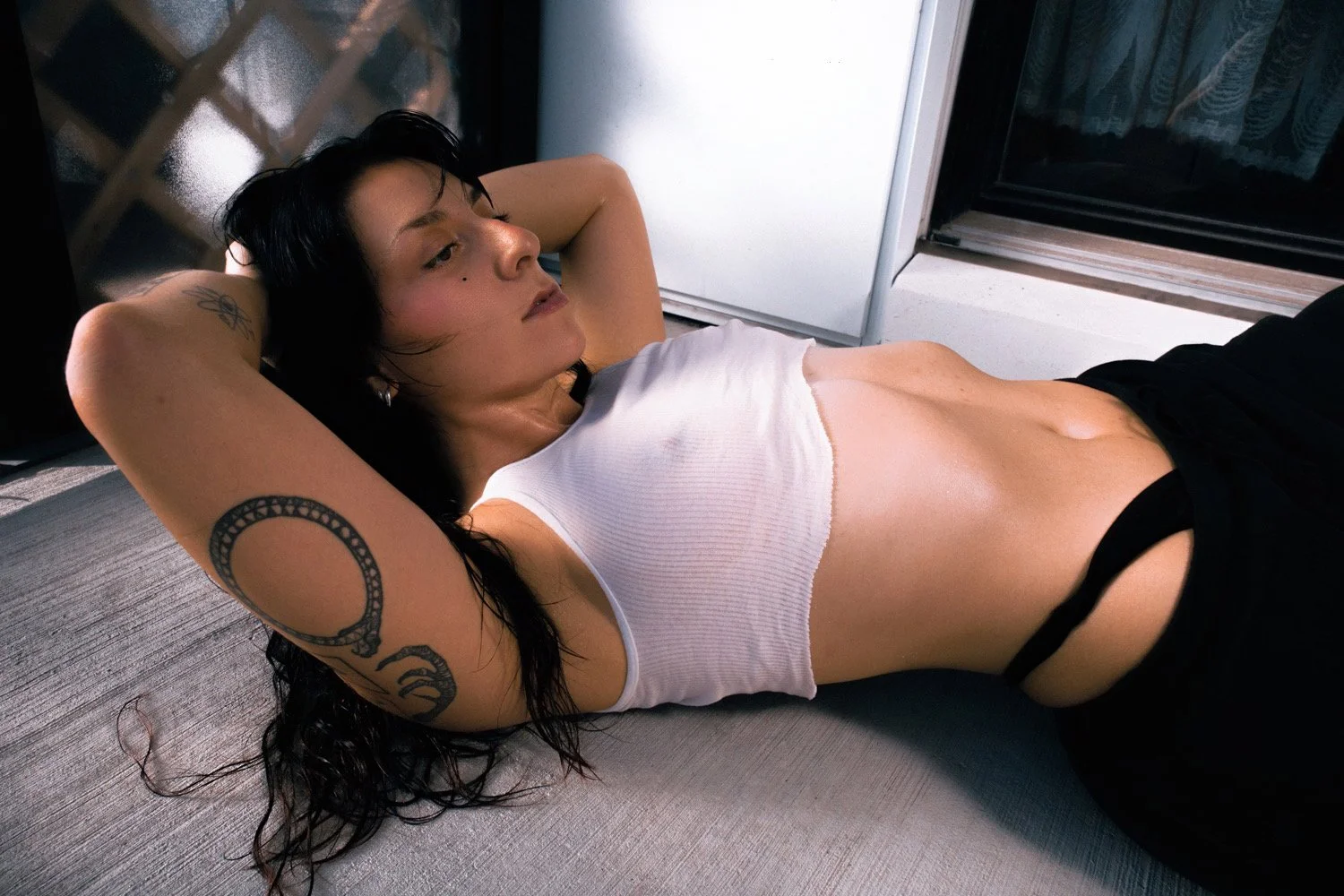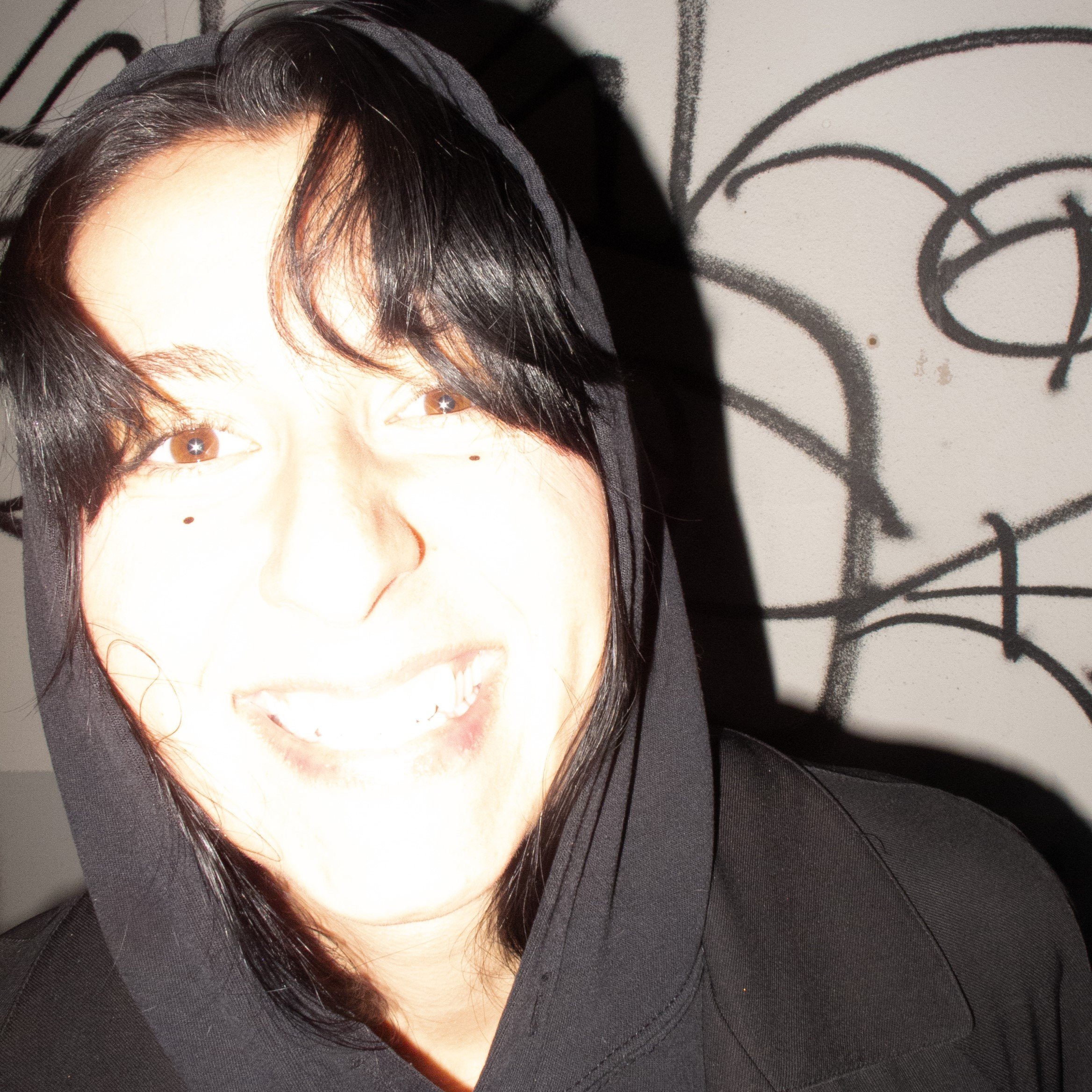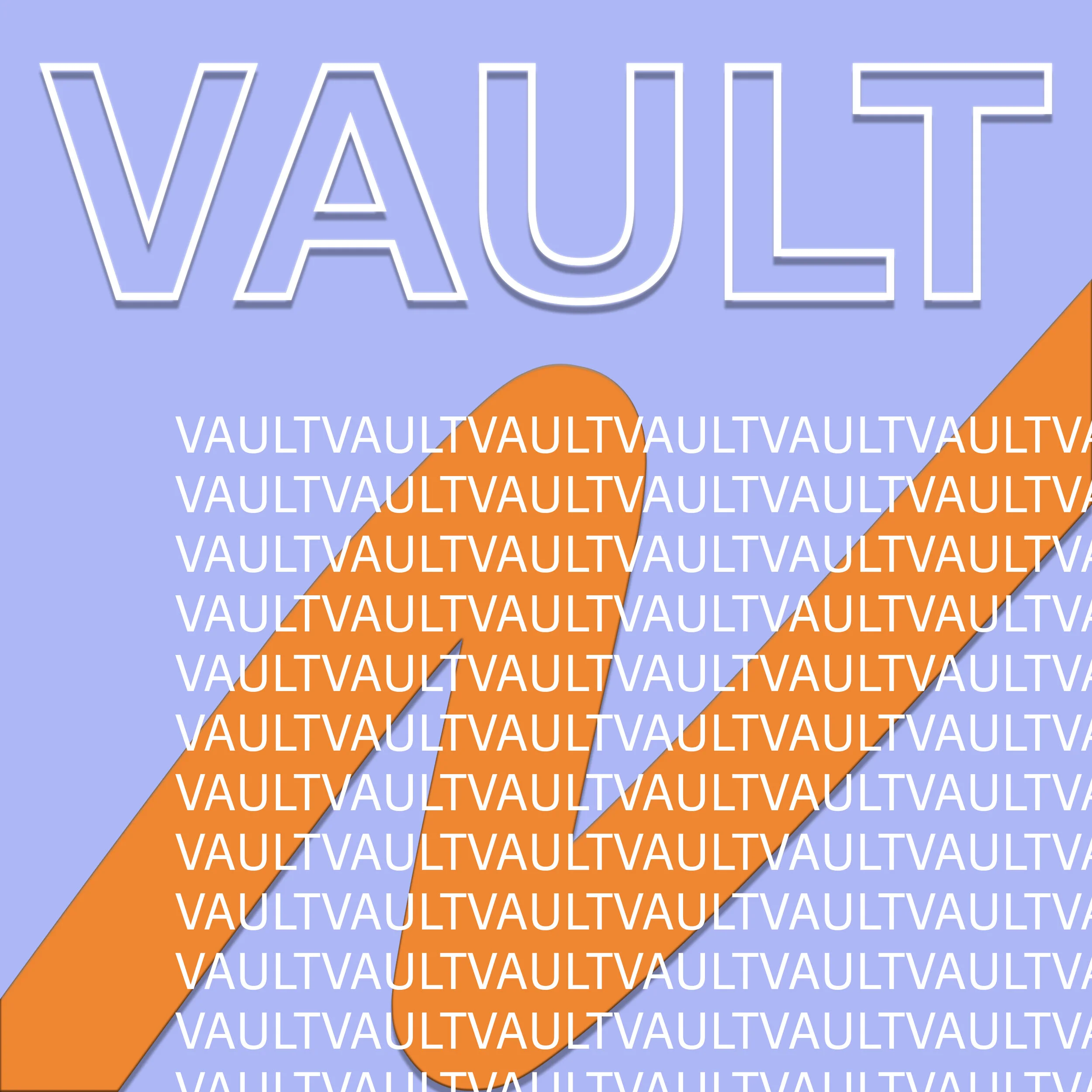D.Blavatsky’s New Single “FUK” Provides a Jaw-Clenching and Purifying Experience
D.Blavatsky by Feng Ish
Raw, tormenting, and cathartic – just some of the terms one might use when describing Montreal-based DJ, producer, and artist D.Blavatsky’s newest release “FUK.” This single emerges as part of their forthcoming album YOUR CHOICE, which will be released on November 11. Its inception stems from the symbiosis of D’s experience with the Calgary punk scene in their teen years, their active role in the Montreal electronic music scene, and the acute solitary reality of the pandemic years spent in their parents’ basement recording music.
From the fragmentary nature of the music video to the album’s themes of longing and desire, my conversation with D last week provides a glimpse of their complex artistic identity.
From a Calgary goth-punk band vocalist-drum-machinist to an established Montreal DJ
D’s musical origins are rooted in the Calgary noise-punk scene, which they became part of during their teenage years. They explained that the “...big shifts [happened] when [they] started hosting a show at CJSW,” a local college radio station. From there, their musical interest intensified, and began shifting away from punk, noise, and instrumental productions to more electronic ones.
Another memorable moment stems from when they were 19 and formed a band, Torture Team, with three of their best friends. Torture Team was a goth-punk band, and D played the drum machine and served as the vocalist. They released one self-titled tape. As they spoke about it, D’s eyes were twinkling: “I really, really recommend that everyone is in a band at least once in their life,” they explained. “That was a really special time in my life. I look back on it with a lot of love and gratitude.”
A year later, they would arrive in Montreal with two of their bandmates, a move that would mark a turning point in their artistic and musical career.
D.Blavatsky by Feng Ish
“It was once I created the single “FUK” that I realized everything I had created previously was completely beside the point of what I was trying to do. And I scrapped that entire album.”
D began writing and creating the single “FUK” about three years ago. At that point, they had completed a draft of the whole album, composed of 15 pieces, which they discarded when they finalized the single that changed their vision of the album as a whole. The song, which was “mostly just a mistake,” as they explained, led to profound revelations. “[I realized] that this is what I’m trying to communicate…I just felt very close to the language I [was] trying to create.”
“But this track really changed everything for me, because so much of this album was a learning curve of me just learning how to use digital production tools.”
This track was a turning point in D’s creative process in making the album. “I just felt inspired in a different way,” they explained. Throughout the album creation process, they began to move away from hardware production to digital, Ableton production. Their intentions also shifted: in the first version of the album, they said they felt that they were catering to some kind of audience or in a way they “had to,” so that it might appear more palatable.
But in creating “FUK,” they ruptured these mental standards. “[It] was a very pivotal moment, because it really showed me that it’s like, ‘okay, you can communicate.’” Going further, they explained that, as an artist, it is generally expected that you are “...reflecting on what perspective [you are] trying to communicate," or asking yourself why you are unique. Yet this kind of thinking doesn’t fit with their artistic process or experience. “This idea of creating a timeless work of art… I never cared about that. If my work doesn't necessarily age well within the broader cultural landscape, that's beside the point for me. I'm just trying to communicate something somehow.”
“Yeah, and “FUK” really just was like, holy shit. ‘I can do it.’ I think it was just really reaffirming…this track just embodies everything…I have something that I want to say and express.”
The creation is representative of a particular time – much of it was developed during the pandemic. The single–and, more broadly speaking, the album–seek to illustrate the complexity of desire, longing, and vulnerability within capitalist structures. On a more personal level, the works represented an exploration of a certain vulnerability they previously struggled to express.
Over a period of two years, D barely saw anyone – they said it was about eight months after they had burrowed themselves in their parents’ basement that they saw someone outside for the first time. And yet, this period of solitude was also a transformative moment for them: “The pandemic and this album was very much a metamorphosis for me, who I was when I made it.”
“[YOUR CHOICE is] about longing, it's about desires in the most primal sense, like sexual desire, physical desire […] I'm getting my head nailed into the wall.”
D.Blavatsky by Feng Ish
Vocals, digital music, and a stream of consciousness
When listening to “FUK,” one element that grasps the listener are the vocals. Blending into the digital components of the song, one feels drawn into the destabilizing and intimately vulnerable mood that the vocals embellish. When I was preparing my interview questions, one of the things I was curious about was the intentions behind incorporating vocals, something which, unlike other genres, is not so common in experimental electronic music.
To begin, there is the process of creating the very content of the vocals. “FUK,” along with other songs on the album, often involves deciphering gibberish – quite literally. D explained to me that what they often do, including for this single, is “...create scratch vocals where [they] play around with cadence and syllables and tempo” of a digital production. “[I] just say random gibberish. And then I record that and then try to decipher the gibberish itself.”
When creating the song in their parents’ basement, they could never sing the vocals as loudly as would be featured in the final version. The final recording ended up happening in the studio of their good friend Keïta Saint, a producer and voice engineer, living in NDG. In a single, last-minute take before the curfew of noise complaints, the vocals were recorded: describing the moment of the recording, they explained that “...you could feel the static in the room.” D offered to do another take, but “...Keïta was just like ‘no, this is fucking it, you will never get a better take.’”
The music video accompanying “FUK” has its own story. D’s vision of the video was first situated in a cave: running through a cave, feeling claustrophobic, with a light constantly out of reach. Yet as they needed to adapt to the environment they were in, director Axel Zavala helped create a video that translated D’s vision with the single.
The creation itself went by fast. Axel, who had been working on other projects, connected with D right before they headed back to Montreal. In just two days, they went into the woods in the night, armed with a GoPro and camcorder. With ten hours of footage, they were able to create a visual embodiment of the disorienting and stimulating nature of the piece.
Montreal, the rave scene, and moving forward
Throughout our conversation, it was clear that the Montreal electronic music scene continues to significantly influence D’s art – both as a producer and DJ. Being a raver has been a consistent and essential part of who they are. “[Raving] has pretty much been my life for the last five years… it is the primary way that I develop social relationships with people, and that I maintain the social relationships I have… [it’s] a sense of connection and expression.”
Once D arrived in Montreal and became involved with the collective Cyberia, something of a community became evident to them. Whereas a mix of social anxiety and dysphoria had made their teen years unstable and difficult, the engagement they have found in Montreal’s rave scene has been a way to come to appreciate and validate themself. “I learned how to celebrate my body. And I learned all of the beautiful things that my body could do for me and how to express [myself] and be present. I think that was [about] being present in my body in a positive way, in a way of celebration.”
YOUR CHOICE by D.Blavatsky
Moving forward, they look forward to continuing as a DJ, producer, and organizer in the Montreal electronic music scene. After living through the metamorphosis of the pandemic as well as visiting some Europe’s techno hotspots, D explained that they came to understand that Montreal has something special that they hadn’t seen elsewhere. “I think one of the biggest faults of our creative realms here is just how much people take it for granted.”
This upcoming album release is far from being their only project in the works. In just one week, they are hosting RIP VAULT for Halloween weekend, which will feature a myriad of local DJs. After releasing YOUR CHOICE on November 11, they hope to get working on the next one right away, which would ideally be released by next summer.
Although the Montreal electronic music scene was deeply rocked by the pandemic, it is coming out of it in new and unpredictable ways – and D.Blavatsky is sure to have a role in the way it will transform itself. Whether in terms of the music they release or the infamous raves they organize, their impact on the community is here to stay.
D.BLAVATSKY
Instagram | Bandcamp | Spotify | SoundCloud
Soline Van de Moortele is a tenant rights advocate, insatiable raver, and full-time griever.







































